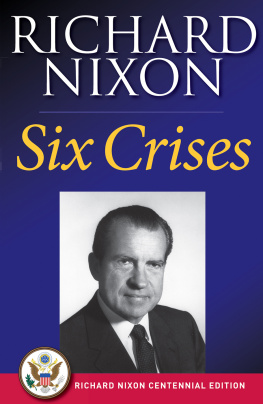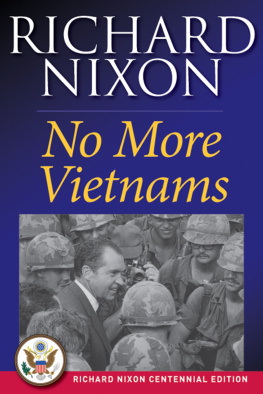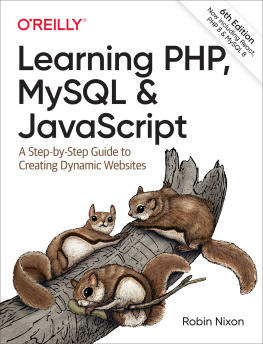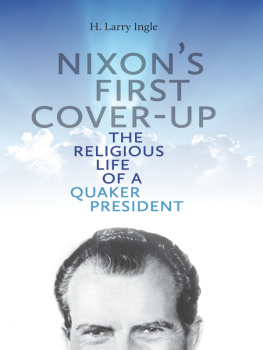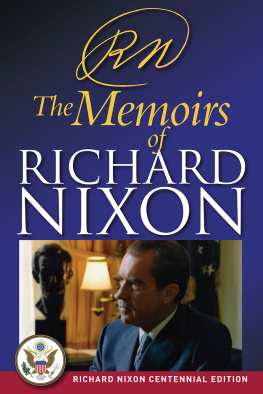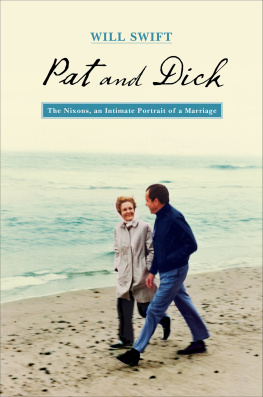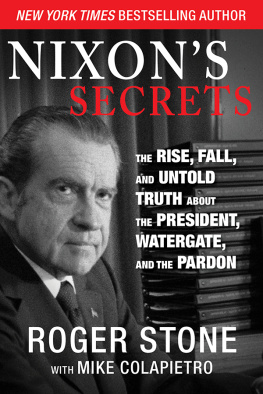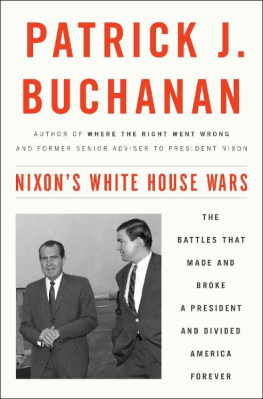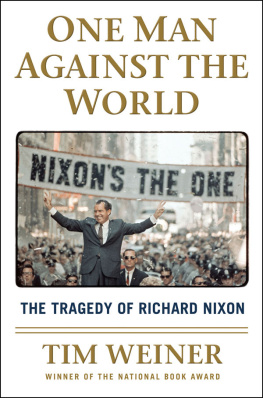Nixon - Six Crises
Here you can read online Nixon - Six Crises full text of the book (entire story) in english for free. Download pdf and epub, get meaning, cover and reviews about this ebook. City: New York;United States, year: 2013, publisher: Simon & Schuster, genre: Science. Description of the work, (preface) as well as reviews are available. Best literature library LitArk.com created for fans of good reading and offers a wide selection of genres:
Romance novel
Science fiction
Adventure
Detective
Science
History
Home and family
Prose
Art
Politics
Computer
Non-fiction
Religion
Business
Children
Humor
Choose a favorite category and find really read worthwhile books. Enjoy immersion in the world of imagination, feel the emotions of the characters or learn something new for yourself, make an fascinating discovery.
- Book:Six Crises
- Author:
- Publisher:Simon & Schuster
- Genre:
- Year:2013
- City:New York;United States
- Rating:5 / 5
- Favourites:Add to favourites
- Your mark:
- 100
- 1
- 2
- 3
- 4
- 5
Six Crises: summary, description and annotation
We offer to read an annotation, description, summary or preface (depends on what the author of the book "Six Crises" wrote himself). If you haven't found the necessary information about the book — write in the comments, we will try to find it.
For many years before he became President, Richard Nixons decisions vitally affected the well-being of the nation. Six of those decisions significantly shaped the man who would later become the 37th President of the United States.
Six Crises is a close-up look at this dynamic man, recalling the demands placed upon him, the thinking behind his decisions, and the pressures of political life.
Six Crises — read online for free the complete book (whole text) full work
Below is the text of the book, divided by pages. System saving the place of the last page read, allows you to conveniently read the book "Six Crises" online for free, without having to search again every time where you left off. Put a bookmark, and you can go to the page where you finished reading at any time.
Font size:
Interval:
Bookmark:

We hope you enjoyed reading this Simon & Schuster eBook.
Join our mailing list and get updates on new releases, deals, bonus content and other great books from Simon & Schuster.
C LICK H ERE T O S IGN U P
or visit us online to sign up at
eBookNews.SimonandSchuster.com
Thank you for purchasing this Simon & Schuster eBook.
Join our mailing list and get updates on new releases, deals, bonus content and other great books from Simon & Schuster.
C LICK H ERE T O S IGN U P
or visit us online to sign up at
eBookNews.SimonandSchuster.com
Also by Richard Nixon
Beyond Peace
Seize the Moment
In the Arena
1999: Victory Without War
Real Peace
No More Vietnams
Leaders
The Real War
RN: The Memoirs of Richard Nixon
To Pat
she also ran
Among the many who so generously gave me the benefit of their advice and assistance in preparing this book, I would particularly like to thank Bill Henry, Earl Mazo, Charles McWhorter, Raymond Moley and Kyle Palmer.
And to Alvin Moscow, for his skilled professional services in directing research and organizing material, my special appreciation.
R.N.
If I had known the effort that writing my first book would require in the very hectic year of 1961, I would not have undertaken the project and might never have written a book at all. As luck would have it, I did write it, and it became the first of eight.
The theme of each of the six crises appears in a sentence or two at the beginning of each chapter. The lessons of what I always called my seventh crisisactually writing the bookcan be summed up just as simply. Busy people should never let their hectic schedules prevent them from applying time to far more important creative pursuits that will broaden their outlook and conceivably produce something of lasting value. But by the same token, they should not put their names on the product unless they are willing to put real effort into what goes inside.
After leaving the Vice Presidency, I had moved our family to California and joined a law firm in Los Angeles. I was writing a monthly newspaper column. I had scores of speaking engagements, not only in California but in other parts of the country as wellthe inevitable fallout from my campaign for President the year before. It was also in this period that I made the decision to run for governor in 1962, a decision that entailed countless meetings with figures ranging from President Eisenhower to General MacArthur, and hours of study and thought.
In the midst of these distractions, Ken McCormick of Doubleday came to California to propose that I write my memoirs. After I described the demands on my time, he assured me that writing a book would not add to them substantially. He said that the custom for major public figures was to hire a good writer to do the job. I would meet with him on occasion and answer questions, and he would do the rest.
I decided to write the book, but I found the usual practice would not work for me. After fourteen years on the national scene, I had made thousands of speeches, and my style was highly recognizable. Al Moscow and Chuck Lichenstein, who provided invaluable editorial and research assistance, were better writers than I was, but neither could make their writing sound quite like mine.
In this era when the ghostwriter often haunts the cover in type as large as that used for the authors name, if not larger, public figures who want to write books worth reading should recognize that there is no substitute for hard work by the author himself. Others can do research and make suggestions. The author alone must supply the theme, the structure, the toneand, perhaps most important, the title.
I developed the organizational approach for this book late one night in the study of the house we had rented in Brentwood. I listed the major events of my career and finally boiled them down to the six that are covered here. At the top of the page, I wrote Six crises. A few days later, when the journalist Adela Rogers St. Johns came to visit me, I showed her the outline. She pointed to the heading and said excitedly, Thats the title.
I still marvel at how we were able to get the manuscript finished in ten months. This was long before word processors, which permit the author to indulge his desire to see a fresh page, even if he has made only minor corrections in a draft. In 1961, changing a comma required a whole page to be typed over.
I have also found that I produce best under intense pressure and in an environment that poses a minimum of distractions. When it was time to write the chapter on my confrontations with Khrushchev in Moscow in 1959, I rented a room in a Los Angeles hotel and spent six days working fourteen hours a day, reading, outlining, writing, and dictating, until the first draft was finished. I ate all my meals in the room. For the chapter on the 1960 campaign, I went up to the Apple Valley Inn, where Don Hughes got me a room in a quiet villa. For seven straight days I went through exactly the same grueling procedure. I could not do the same thing today. It was a close call then.
Reviewers, probably justifiably, criticized the book for being uneven. Nonetheless it was a national best-seller. Even now, four best-sellers and nearly three decades later, I still consider it to be the best book I have published, because of the simplicity of its organization and the clarity of its writing. But it contains one glaring falsehood. In the introduction of the original edition, after discussing the ordeal of writing books I promised, I might start another one, but I am sure I will never finish it. I am pleased that this special Nixon Library and Birthplace Edition gives me the opportunity to set the record straight!
RN
February 14, 1990
Saddle River, New Jersey
First Edition
THE last thing I ever intended or expected to do after the 1960 election was to write a book. I had received the usual offers for publication of my memoirs which are tendered to political leaders who have retiredvoluntarily or involuntarily. But although anyone who goes through a presidential campaign feels immediately afterward that he has lived enough for a lifetime, I still did not believe I had reached the point in life for memoir-writing. Since I had never kept a diary, I was not in a position even to write a detailed account of my eight years as Vice President. Three people exerted particular influence in changing my mind.
Shortly after the election, I had the honor of sitting by Mrs. Eisenhower at a White House dinner. I told her that one of the reasons I had decided against writing a book was my belief that only the President could write the story of his Administration and that, by comparison, any other account would be incomplete and uninteresting. She answered, But there are exciting events like your trips to South America and to Russia which only you can tell, and I think people would be interested in reading your account of what really happened.
In April, I visited President Kennedy for the first time since he had taken office. When I told him I was considering the possibility of joining the literary ranks, of which he himself is so distinguished a member, he expressed the thought that every public man should write a book at some time in his life, both for the mental discipline and because it tends to elevate him in popular esteem to the respected status of an intellectual.
The one who had the greatest influence on my decision was Adela Rogers St. Johns. From the time I entered public life, as a Congressman in 1947, she has been a close friend and adviser. Through the years she has insisted that I should take time off to write a book. Until January 20, 1961, I could always plead that I was too busy. When I left Washington and returned to California, she took matters into her own hands. I received a phone call from her in April informing me that Ken McCormick of Doubleday and Company was flying to California to see me the next day. I protested, as I had many times before, that I did not have a subject which seemed to me worth writing about. You let Ken decide that, was her reply.
Next pageFont size:
Interval:
Bookmark:
Similar books «Six Crises»
Look at similar books to Six Crises. We have selected literature similar in name and meaning in the hope of providing readers with more options to find new, interesting, not yet read works.
Discussion, reviews of the book Six Crises and just readers' own opinions. Leave your comments, write what you think about the work, its meaning or the main characters. Specify what exactly you liked and what you didn't like, and why you think so.

